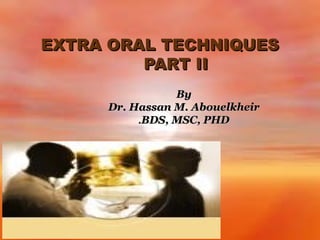
Extra-oral Radiology Techniques II
- 1. EXTRA ORAL TECHNIQUES PART II By Dr. Hassan M. Abouelkheir .BDS, MSC, PHD
- 2. Types of Extra-Oral Radiographic :Examination • • • • • • • 1- Mandibular oblique lateral (Ramus, Body). 2- True Lateral (cephalometric). 3-Submento-vertex view. 4- Water’s projection (occipitomental). 5- postero-anterior projection. 6- Reverse Town’s projection. 7- Linear tomography.
- 3. • • 4-Occiptomental (water ’s view): Standard OM 0° It shows facial skeleton and maxillary antra and avoids superimposition of the dense bones of skull base. • Indications: • 1- Investigation of the maxillary antra. 2- detection of middle third fractures. •
- 4. Occipitomental (cont.): • • • • • 3- Coronoid process fractures. 4- Frontal and ethmoidal sinuses. 5- Sphenoidal sinus investigation. Technique: Radiographic baseline 45° to the film (nosechin) position. Central ray go through occiput (0°).
- 5. Waters (Sinus view) Evaluate the maxillary sinus MSP FP extraoral x-ray unit tip of nose 1” from cassette floor CR
- 7. Occipitomental 30 °(water’s view): • • • • • This projection demonstrate: 1( fracture of middle third of face, including orbital floor. 2( blow out fracture of orbit.. 3( fracture of zygomatic arch. X-ray beam 30°downword to the floor centered through the lower border of the orbit
- 8. ):Occipitomental 30 °(water’s view
- 9. Caldwell (Orbit view) Identify trauma, especially to area of orbit MSP FP CR extraoral x-ray unit floor tip of nose and chin even with cassette
- 12. Posteroanterior (PA) Skull- 5 Identify trauma, pathology, or developmental abnormalities MSP extraoral x-ray unit FP floor
- 14. Postero-anterior view (cont.) • X-ray beam passes in a posterior to anterior direction through the skull . Uses: • Facial growth and development. • Frontal & ethmoidal sinuses. • Orbital & nasal cavity.
- 15. Postero-anterior view (cont.) • • • • Film placement: long axis of the cassette is positioned vertically. Head position: pt faces cassette Canthometal line is 10° above the horizontal Central ray ► center of head ┴ cassette.
- 17. 6- Reverse Townes Image fractures of the condylar neck MSP extraoral x-ray unit head tipped down mouth open FP CR floor
- 18. Reverse -Towne view (cont.): • • • Used for examination of fracture of condylar neck. Postero-anterior wall of maxillary sinus. Film position: cassette is placed vertically.
- 19. • • Reverse -Towne view (cont.): Head position: pt faces the cassette with head tipped down and mouth open widely. Central ray ►center of head ┴ cassette.
- 20. Reverse -Towne view (cont.):
- 24. 7- Linear Tomography • • It is a technique by which structures are blurred below & above a certain plane at which image is sharp (tomographic cut). This is done by filmtube assembly connected by pivot and moved opposite to each other.
- 25. • .(Tomography (cont Conventional film-based tomography (body section tomography) is applied primarily to high contrast anatomy such as TMJ and dental implants. The examination begins with the x-ray tube and film positioned on opposite sides of the fulcrum, which is located within the body’s plane of interest (focal plane). As the exposure begins, the tube and film move in opposite directions simultaneously through a mechanical linkage.
- 26. Blurring of image increases in • • • The farther the structure lies from focal plane , the greater the distance between structure and film. The long axis of blurred structure perpendicular to the direction of tube travel The greater of tomographic angle or arc.
- 27. .(Tomography (cont • • • • • • There are 5 types of tomographic movements: 1-Linear. 2-Circular. 3- trispiral. 4- Elliptical. 5- Hypocycloidal.
- 28. Skull unit
- 29. .(Tomography (cont • • • Linear tomography can be done by 2 ways: 1- the x-ray tube and film move in opposite directions along a fixed fulcrum 2- both x-ray tube and film move along concentric arcs rather than straight line.
- 31. • • • • Drawbacks of linear tomography 1-The blurring pattern is irregular and incomplete. 2-Horizontal streaks (false images or parasite lines) , represent the image of objects outside the focal plane. 3- changing the angulations of beam to focal plane leading to Inconsistent magnification, dimensional instability and non uniform density. panoramic Machines which uses arc shape tomogram cause distorted image because magnification in the vertical plane is independent of that in horizontal plane.
- 32. • • • • Linear Tomography .((cont Multidirectional Tomographic motion is necessary as Tomographic layer has width (thickness of the cut) is inversely proportion to the Tomographic angle. The greater the angle, the thinner of the cut thickness. Wide angle tomography (>10º)allow visualization of fine structures (1mm) but suffer from decreased image contrast. Narrow angle tomography (<10º) →Zonography due to thick zone of tissue (up to 25mm)
- 33. Linear
- 35. Transcranial
- 36. Panoramic Film (special computer positioning(
